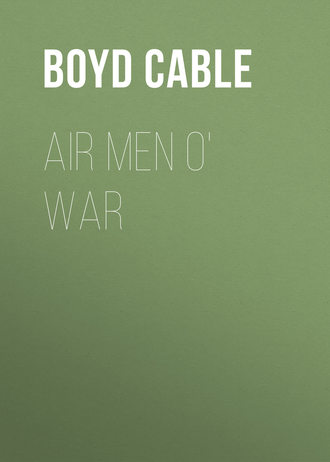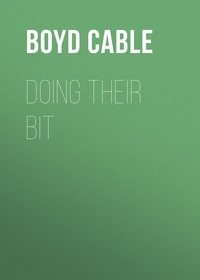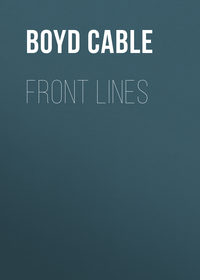 полная версия
полная версияAir Men o' War
But the odds were to lengthen to such an extent that even the seasoned and daring fighters of No. Umpty Squadron began to look grave and feel concerned. Two Flights came looming up rapidly from eastward, and, occupied as the Fo-Fums were with the first brush, the new enemies were upon them almost the instant the second rush on them finished – before, in fact, the first Huns shot down and hit the ground. The newcomers converged on the fight and dashed straight at the Fo-Fum circle without a pause. There were twelve of them in one lot and eight in the other, and that, added to the twenty the Fo-Fums had counted at the beginning of the fight, made a total of forty machines against their six.
After this the tale of the fight can no longer be told as a whole. It developed into a series of rushes and dives on the part of the enemy in large or small numbers, swift leaps and turns and twists, and plunges and checks, repeated hot attacks and attempts by the Huns to break the Fo-Fums' steady circle, determined and fairly successful efforts of the Fo-Fums to foil the attempts. For long minute after minute the fight swayed and scattered, flung apart, out and down and up, climbed and fell and closed in again to point-blank quarters. It ran raging on and on in a constant fierce rattle and roll of machine-gun fire, a falling out, one fashion or another, of Hun after Hun, in occasional desperate fights of single Fo-Fums forced out of the circle and battling to return to it.
Some of these single-handed combats against odds are worthy subjects for an air saga, each to its individual self. There was, for instance, the Fo-Fum which was forced out of the circle, cut off, and fought a lone-hand battle against eleven enemies. The observer stood and shot over his top plane at one Hun who tried to cover himself behind the tail of the Fo-Fum. The pilot at the same instant was lifting the nose a little to bring his gun to bear on another Hun diving on him from ahead, and this sinking of the Fo-Fum's stern gave the observer a chance. He filled it with a quick burst from his machine-gun, and filled the Hun so effectively full of bullets that his nose dropped and he swooped under the Fo-Fum. The observer jumped down to his bow gun, swung the muzzle down, and caught the Hun passing under with a burst which finished him and sent him whirling down out of control.
The pilot's shooting at the same time was equally effective. The Hun who had dived on his right front was met by a quick turn which brought the bow gun to bear and a short burst of fire. The Hun continued to dive past and under, and both pilot and observer caught a flashing but clear-imprinted picture of the Hun pilot collapsed in a heap on his seat before he also fell helplessly rolling and spinning down out of the fight.
The observer, dropping his forward gun as he saw his shooting effective, scrambled quickly up to his top gun and was just in time to open on another Hun not more than twenty feet away and with his gun going "nineteen to the dozen, and rapping bullets all over the old bus till she's as full of holes as a Gruyère cheese," as the observer said. He only fired about a dozen rounds – the fight by now had been running long enough and hot enough to make economy of ammunition a consideration – but some of the dozen got home and sent another Hun plunging down and out.
The observer just lifted his eyes from watching the "late lamented" and trying to decide whether he was "outed" or "playing dead," in time to catch a glimpse of a black cross streaking past astern of him. He glued his eyes to the sights, jerked his muzzle round after the fresh enemy, and just as he swung in a steep bank "slapped a hatful of lead into him" and saw a strip of the hostile's cowling rip and lift and beat flailing back against the struts until the enemy shut off engine and glided out.
The pilot's gun was clattering again, and the observer, seeing all clear behind him, turned and half jumped, half fell, down into his cockpit as the Fo-Fum lay over on her beam-ends in a bank that brought her almost sheer on her wing-tip. He was just in time to see the pilot's fresh victim fall out of control, and dropping the bow gun he had grabbed he hoisted himself to his top gun again.
It sounds a little thing when one speaks of all this jumping down and scrambling up from one gun to another, but it is worth pausing to consider just what it means. The place the observer had to jump from at his top gun was about as scanty and precarious as a canary bird's perch; the space he had to jump or fall down into was little bigger than a respectable hip-bath; the floor and footholds on which he did these gymnastics were heaving, pitching, and tossing, tilting to and fro at anything between level, a slope as steep as a sharp-angled roof, and steeper still to near the perpendicular.
And all the time the machine which carried out the acrobatic performance was travelling at the speed of a record-breaking express train, and if the performer mis-jumped or over-reached the enclosing sides of his cockpit, sides little more than knee-high as he stood on the floor, not ankle-high as he stood at the top gun, he had a clear eight to ten thousand feet, a good mile and quarter, to fall before he hit the ground. And this particular Fo-Fum stood on her head or her tail, on one wing-tip or the other, dived and dodged, twisted and turned and wriggled and fought her way through, over, under, and about her eleven opponents, putting four well down and a fifth damaged in the process, and picked up her place in the shifting, breaking, and ragged, but always reforming, circle.
The fight flared on for full forty minutes, and still at the end of that time the Fo-Fums were all afloat and able to make home and a good landing, although some were so shot about and damaged that it was only by a marvel of piloting skill they were kept going – and, let it be added, as their crews never failed to add, because they were stout buses well and honestly built of good material by skilled and careful hands, driven by engines that were a credit to the shops they came from and would "keep running as strong as a railway locomotive, into Hell and out the other side, s'long's you fed oil and petrol to 'em."
One machine had the oil tank shot through, and yet the engine ran long enough without "seizing up" (melting the dry metal by friction to sticking point) to get home. There were other mechanical miracles – too technical for explanation here – that the pilots tell of with wonder and admiration, although they say little, or at most or no more than a mild "good man" or "sporting effort" of the equal or greater miracle of men enduring and keeping their wits and stout hearts, and carrying on, whole or wounded as some were – one observer to his death soon after landing – for that forty minutes' savage fight against odds. Full forty minutes, and at the end of that time there were only some score Huns left in the fight: and in the finish it was they who broke off the action, and slid out and away down wind.
"Y'see," as the Flight Leader said after when he was asked why he didn't pull out or battle his way out and home, "Y'see, the old Fo-Fums are pretty well known on this slice of front, and they've got a reputation for never chucking a scrap. I'd have hated to come plungin' home with a crowd of Huns hare-in' after us. The line 'ud think we'd been runnin' away from a scrap; and I wouldn't like my Flight to be letting down the old Fo-Fums' reputation like that."
Most people will admit that the Flight didn't let it down. There are even a good many who think it added a good-sized gilt-edged leaf to the Fo-Fums' and the Umpty Squadron's plentiful laurels.
XI
LIKE GENTLEMEN
When Lieutenant Jack Smith, new come from a year of life in the trenches and reserve billets, landed for a day or two's stay with his brother in one of the squadrons of the R.F.C., he began to think he had strayed into an earthly Paradise, was amazed that such an excellent substitute for well-found civilised life could exist in the Field.
He got the first shock when he arrived at the 'drome about 8.30 a.m. and found his brother still comfortably asleep. While his brother got up and dressed he explained that, the Division being out on rest near by, he had taken a chance of the long-standing invitation to come and spend a day or two with the Squadron; and while he talked his eyes kept wandering round the comfortable hut – the bookcase, the framed pictures on the walls, the table and easy-chair, the rugs on the floor, all the little touches of comfort – luxury, he called them to himself – about the place.
"You're pretty snugly fixed up here, aren't you, Tom?" he burst out at last.
"So, so!" said Tom, pouring a big jug of hot water into the wash-basin – hot water, thought Jack Smith, not only for shaving, but to wash in. "Being Flight Commander, I have a shack to myself, y'see. Most of the pilots share huts. We'll fix a bed here for you to sleep. Hullo, quarter-past nine! I must hurry – won't be any breakfast left. You had brek?"
"Two hours ago," said his brother. "We don't lie in bed till afternoon, like you chaps."
Tom laughed. "Not my turn for dawn patrol," he said; "I'll be on to-morrow. My Flight's due to go up at noon to-day." And he went on outlining the methods of their work.
In the Mess they found half a dozen other pilots finishing breakfast. "My brother Jack – going to spend a day or two with us" – was introduced, and in ten minutes found himself pleasantly at home amongst the others. He began to forget he was at the Front at all, and the attentive waiter at his elbow helped heighten the illusion. "Tea or coffee sir?.. Porridge, sir?"
Jack had porridge, and fresh milk with it and his tea. Fresh milk – and he'd nearly forgotten milk came from anything but a tin! Then he had a kipper – not out of a tin, either – and bacon and eggs and toast and marmalade. It was his second breakfast, but he did it full justice.
After breakfast he went out with Tom to the hangars, and had a look over the machines and pottered round generally until after eleven. Then Tom went off to get ready for patrol, and handed him over to "Jerry," one of the pilots. Jack spent a fascinating hour watching the patrol start, and then being taken round by Jerry, who was bubbling over with eagerness to show and explain and tell him everything.
Then they had lunch, and again Jack was led to forgetfulness that he was at the Front. Sitting there with a dozen happy, laughing, chatting companions at a table spread with a spotless cloth, with a variety of food and drinks to choose from, with no sound of guns or any other echo of war in his ears except the occasional hum of a plane overhead – and that was pleasant and musical rather than warlike – he felt and said he might as well be in a long-established Mess in barracks at home.
After lunch he sat in the ante-room with the others round the big, open fireplace and smoked a cigarette and skimmed the plentiful weeklies until Tom's Flight was about due in. Jerry picked him up again and took him out and showed him the Flight when they were pin-points in the sky, and explained the process of landing as they came in.
Jack found his brother's machine had brought home several bullet-holes, and he was oddly thrilled at sight of them – oddly, because he thought he was completely blasé about bullet-holes and similar signs of battle.
Tom made very little of it, merely saying Yes, they'd had a scrap, had crashed one Hun and put another couple down out of control; and who was on for an hour on the canal?
Jack went to the canal with them, and found they had there a wonderful boat built by the pilots out of planks they had "found." The boat held two comfortably, four uncomfortably, and on this occasion carried seven. They fooled away a couple of hours very happily and school-boyishly, landed, and went back at a jog-trot to the 'drome. The wind had changed and they could hear the guns now, heavily engaged, by the sound of them.
They were back just in time to see a patrol go up, and Tom hurried Jack out to watch. "We've got another Squadron's Major here, staying to dinner to-night, and the patrol is taking off in a fancy formation that's our own special patent. It's worth watching. Come along."
It was worth watching, although Jack, perhaps, was not sufficiently educated in air work to appreciate it properly. The Flight was drawn up in line facing into the wind, and, after a preliminary run up of their engines, a signal was given, six pairs of chocks jerked simultaneously clear of the wheels, and the six machines began to taxi forward over the ground, still keeping in line.
Their speed increased until they were racing with tails up, and then, suddenly, the whole six lifted together and took the air, keeping their straight line and climbing steadily. The right-hand machine swept round to the right, and one after another the rest followed him, each banking steeply and, as it seemed from the ground, heeling over until their wings stood straight up and down. As they straightened they opened out and dropped into their places, and the Flight swept circling round above the 'drome in correct and exactly-spaced formation.
"Pretty good show," said Tom critically.
"You wouldn't understand rightly, Jack, but it's a fancy stunt we've never heard of another squadron being able to do. Sheer swank, of course, I'll admit, but rather sport."
Later, Jack was able to appreciate better what the "stunt" was worth from the admiring and amazed comments of the much-impressed visiting Major.
Tea followed, and after it the pilots drifted off to such occupations or amusements as they desired. Some lounged in the ante-room, with the gramophone singing, whistling, and band playing; others went off to the hangars to see to something being done to their machines, engines, or guns; others vanished into their huts, and, reappearing stripped, began strenuous work on a punching-ball or disappeared over the surrounding fields on a cross-country run. The brothers wandered round, and finished an idle hour with a brisk turn at the punching-ball.
"Gets a good sweat up," explained Tom, "and helps keep you in condition. That's the curse of this job – not getting any exercise unless you do something of this sort."
"Curse of it!" said Jack enviously. "Blest if I see much of a curse of any sort about it. It's amazing to think anybody can be in the middle of a big push in this war and be able to have such a ripping fine time of it."
Tom laughed. "Our C.O. always swears this is the only end of the old war where a man is able to live like a gentleman and fight like a gentleman," he said. "And I don't know he isn't right."
"It's the only side I've seen where you can," agreed Jack. "You certainly live like gentlemen, anyhow."
"Oh, it's gentlemanly enough fighting, too," said Tom. "Anyhow, you do go out to scrap with your face washed and a clean shirt to your back, and come straight home to a hot bath inside half an hour after, if you like. And in the actual fighting it's clean scrapping – putting your skill against the other fellow's, and the best man winning, as a rule. None of your blind floundering through mud and shell-fire for me, thank'ee, and getting scuppered without a notion who did it or how you got it."
That evening they changed for dinner, Tom lending a pair of slacks to his brother. "Might as well," said Tom. "Not that it matters about you, because I could tell the C.O. you didn't bring kit. But he likes everyone to dress properly for Mess, and so do we all. Dunno he isn't right, too. Now, will you bath first, or shall I?"
The bath arrangements were explained to him – the bath being a curtained-off corner of the hut with hot water in a canvas bath on the floor and a shower operated by pulling a string to a tank on the roof.
"We're having the band for dinner to-night," said Tom, as they dressed. "We rather pride ourselves on our band, y'know; eleven instruments, and all real good performers picked up all over the shop, and in the Squadron as batmen or mechanics or something. Lots of 'em were part or whole professionals in civvy life."
"I feel as if I were going to a ball or a banquet or a box at the opera or something," said Jack, as they walked down to the Mess – "I feel so amazing clean and groomed and sleek. And you lucky beggars have this any old night, and right in the middle of the war, too!"
The evening "put the tin hat on it" as he said. There was a champagne cocktail before dinner, and then the Major led the way into a Mess that made Jack blink his eyes. The table down the centre was big enough to take the whole score of diners and of generous enough width to allow of stretched legs without kicking opposite shins and toes. It was covered with a spotless cloth, glittering cutlery, and shining glass, and down the centre were shaded electrics and vases made from polished brass shell-cartridges filled with flowers. The C.O. sat at the head of the table with the Major-guest on the one side and Jack on the other with his brother beside him. There was a full-course dinner most excellently cooked and served, and there was almost any drink available you liked to call for, although Jack noticed that his brother and most of the others drank fresh-made lemonade or something of the sort.
"It's one thing you have to cut out pretty well," explained Tom. "This game doesn't leave room for men with anything but steady nerves, and most of us find little or no liquor and not too much smoking gives you the longest life and gets the most Huns. We're all out for the most Huns, y'see, and pushing up the Squadron's record. Over the hundred crashed in under six months now and we want to pile it up. There's hardly a man here hasn't got anything from two to a dozen a-piece."
"Doesn't seem to sit on their consciences," said Jack, looking round the table of happy faces and listening to the chatter and laughter that ran steadily through the dinner. Out in the ante-room the band played light and cheerful music.
"Some band," said Jack admiringly in answer to a remark from the C.O. "Good as a West End Theatre; makes me want to get up and dance," tapping his foot in time to the alluring rag that the music had just slid off into.
"You people evidently believe in the 'eat, drink and be merry, for to-morrow, etcetera' theory," said the visiting Major.
"Why not?" said the C.O. quickly. "Let's live decently while we can, I say. We're all proud of the Squadron, and all keen to do the best we can to make it the best in the Field, in living, and feeding, and comfort – and fighting. And the theory seems to work all right."
"Looking at your record," said the other Major, "it does."
They were at the second course, when half a dozen pilots came in in ones and twos, went to the head of the table and made their formal apologies for being late, and went to their seats. They were the evening patrol, and the Leader took his place near the Major's end of the table.
"Anything doing to-night?" asked the Major when the Captain had been served and commenced his soup.
"Quite a brisk scrap," said the Captain proceeding industriously with his soup. "That's what made us so late. Chased a bunch of fourteen Albatrii and had twenty minutes' scrapping with them."
"Get any?" asked the Major.
"Two crashes and three down out of control. Jerry got one crash and I got the other. Makes the Squadron tally a hundred and seven, doesn't it?"
"Yes, good work," said the C.O., and called down the table "I hear you bagged another to-night, Jerry. How many does that make?"
"Hundred and seven to the Squadron, sir," said Jerry, "and eight to me."
The Flight Leader, hurrying his dinner to catch up to the others, went on to tell some bald details of the fight. Jack sat drinking it in, although it was rather a technical and air-slangy account for him to understand properly, and all the time he could not get it out of his mind how extraordinary it was that this man and the others who half an hour ago had been fighting for their lives, shooting men down, hearing (and seeing as he gathered from the story) bullets crack past, tearing home at a hundred and odd miles an hour with the reek and roar of a big battle beneath them, with shells puffing and coughing about them as they flew, should now be sitting, washed, bathed, cleanly and comfortably dressed, at a full-course dinner, with flowers on the table and a good band playing outside. He had seen plenty of fighting himself, but with such a difference, with such a prolonged misery of short sleep, scratch meals, hard physical work, living in mud and filth and dirt and stench, under constant fear of death or mutilation, that this air-fighting appeared by contrast – well, the C.O. had it right, "living and fighting like gentlemen."
The port went round, followed by the coffee, cigarettes, and liqueurs, the niceties of Mess etiquette, Jack noticed, being very punctiliously observed, and no man touching his port or lighting his cigarette before the Major touched and lit his, none moving from the table until after the port had been round, and so on. The evening finished with a couple of very jolly hours in the ante-room where the gramophone took the place of the band in alternate turns with musical pilots at the piano. A group hung round the open fireplace chatting and joking, another round the piano where one pilot played musical pranks, sang topical air songs, and played seductive melodies that set half a dozen couples "ragging" round the room, and two or three tables collected for Bridge and Poker.
Jack, revelling in the comfort and pleasantness of the whole thing, was haled at last by Jerry into a set for Bridge, and played for an hour just the sort of game he liked – good enough to be interesting, free and easy and talkative enough not to be stiff and boringly business-like.
He was very thoughtful as he undressed for bed – a comfortable camp bed, with a soft pillow, and pyjamas – and Tom looked at him with a glimmer of a smile.
"Wondering if you'll put in for a transfer to Flying Corps?" he asked.
Jack was a little startled.
"Well, something like that – yes," he admitted. "You do seem to have such a ripping good time of it, and right bang in the war, too. It's amazing."
"'Tisn't all pie, all the time, y'know," said his brother seriously. "Pretty strenuous at times."
Jack grunted scornfully, with his mind on what strenuous times in the line meant.
"We'll talk it over to-morrow," said Tom. "Must get a sleep now. I'm on dawn patrol."
Next day was very much like the first, and Jack felt the inclination grow to consider a transfer to this life of luxury and ease.
But the afternoon brought a new side of air work to him. The remains of a patrol – three machines out of six – straggled home with riddled machines and the tale of a hot fight. Jack gathered and sorted out and had interpretations of the involved and technical details, and they made his blood run hot and cold in turn. The six had fought a big formation of fifteen to twenty Huns, fought them fast and fiercely for a good fifteen minutes, had crashed five certainly and put others down without having time to watch their end, had routed and driven east the remainder of the formation. But they had lost two men crashed. One had his top petrol tank holed and the top plane set on fire. He was low down and fighting two Huns, and he might with luck have dived down and made a landing in Hunland. He preferred instead to take one more Hun down with him and lessen the odds against his fellows, had deliberately flung his machine on the nearest enemy, crashed into him, and went hurtling down, the two locked together and wrapped in roaring flames.
Another had his engine hit, but with water spraying out from his radiator fought on and finished his individual combat, and put his Hun down before he attempted to turn out and make for the lines. He had flown long enough after receiving the damage to make it a matter of speculation whether his engine could get him home or not, but he flung away this last chance by turning aside from his homeward flight and throwing away a couple of thousand feet of height to dive in to the assistance of another of our machines hard beset by four enemies. One of these he crippled and drove down, and another his divers on gave a quick chance to the hard-pressed pilot to shoot down and crash. But the damaged engine by now was done, and the pilot could only turn his nose for the lines and try to glide back.





